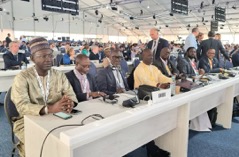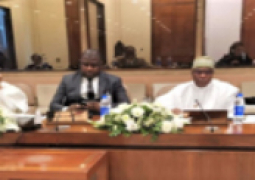
The Gambia did so on Pan-Africanist lines as it intended to ensure that Africa gets continental representation at the international telecommunications body.
The elections, which concluded on the 30th of September, in Bucharest, Romania, were conducted during the ongoing ITU plenipotentiary meeting (26th September to 14th October).
Despite running a spirited campaign with challenges as a small country, The Gambia conceded in round 2 to Zimbabwe to ensure Africa had a representative at the ITU.
Rather than stay in the race and split the vote for Africa and deny continental representation, The Gambia timed its exit well, with sincerity and anchored on a well'-received concessionary speech by minister of Communications and Digital Economy, Ousman Bah.
As a team, after the rousing reception received after our concessionary speech, The Gambia was complimented for apt timing to pull out and back Zimbabwe.
The concession speech delivered by Ousman Bah on behalf of The Gambia and after consultations at the highest level demonstrated The Gambia’s sincerity to run the race for its candidate to the end without destroying Africa’s overall opportunity and objective to have a candidate back in the senior management decision-making team of the ITU.
Also present at the elections was the Foreign Minister Dr. Tanagra who added weight to the presence of Ousman Bah, presenting with the highest level representation.
The Gambia was warmly congratulated for stepping down when “we did and despite not getting the job our gesture was well noticed and received.”
In the 1st round of votes, Zimbabwe got 59, the Bahamas had 47, The Gambia got 35, Pakistan got 20, Cameroon got 11 and Congo Brazzaville 8. In the 2nd round votes: Zimbabwe got 81 Bahamas got 59, Pakistan got 5 and The Gambia got 26 votes before pulling out to back Zimbabwe for the third round.
The Gambia achieved its eventual aim, as candidate for Zimbabwe, Cosmas Zavazava, was elected Director of ITU's Telecommunication Development Bureau, which is responsible for mobilizing global efforts to connect the unconnected through promoting equitable and inclusive digital development, upgrading infrastructure and capacity for developing countries, and initiatives to extend the benefits of technologies to all.
Read Other Articles In Headlines

Gunjur-Berending murder trial: Witness testifies accused shot Buba Jammeh
Jan 23, 2026, 12:55 PM




